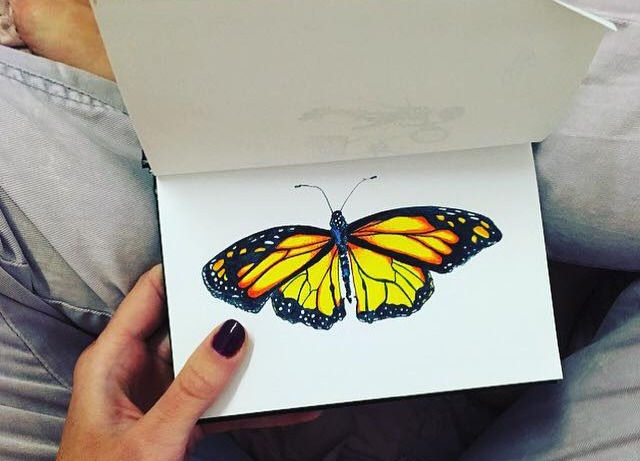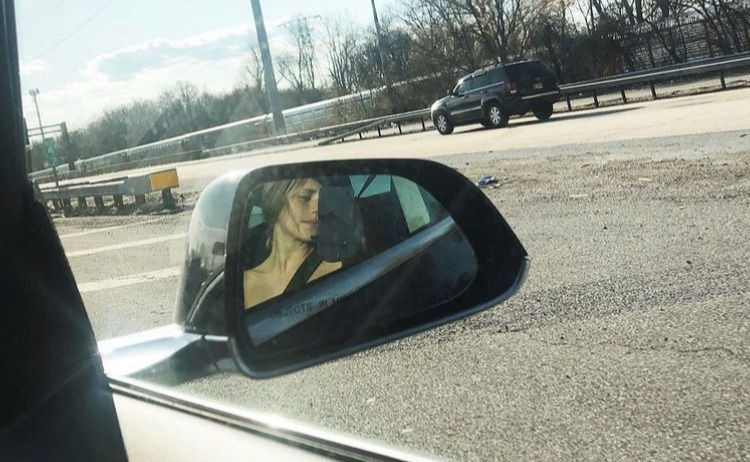A 'normal' graduation
- Claire Wolters

- May 12, 2021
- 7 min read
Updated: May 14, 2021
I received my college acceptance letter in the hospital. My parents brought it along with a few other letters, magazines, and random bits and pieces I asked for to help waste the time (e.g., scrabble).
It wasn’t too exciting. Wrong or right, I expected to get into Temple University. And wrong or right, I didn’t have a whole lot of energy to celebrate.
To be frank, I was more concerned with what I would eat for lunch that day — it likely contained a roast beef sandwich that I was told I “actually do enjoy, but [my] eating disorder tells me [I] don’t” (despite the fact that no one enjoys hospital food, even those without anorexia) — than my prospect in higher education.
Anyway.
I didn’t plan to apply to Temple. I enrolled in Emory University the summer before, and left on medical leave in the fall. Up until winter, I assumed I would return. But at Emory I ran cross country. All of my friends were on the team. Given my physical state, I wouldn't be running again — at least not competitively — by next season, and even if I did manage to pass the sports physical, would I be fast enough? Regardless, I doubted I could shake “that anorexic girl,” from my locker room nickname.

At the time, applying to Temple felt like running away from Emory. Looking back, I was simply changing direction.
The first time I left the hospital overnight was on a college visit. Not to Temple, but to Rhode Island School of Design (RISD). RISD ranked second best art school in the nation in 2016, and my acceptance was an ego boost at minimum. I always enjoyed making art — painting, drawing, doodling — and fine-tuned my process in the hospital. Art was the only thing I loved that I was still allowed to do.
But I didn’t love RISD. I remember feeling nervous about being trapped in a one-career path, in a small city, in a small world. After a year of being trapped in small spaces, I wanted something large. (Plus, RISD’s mascot is a penis.) So, it was during my RISD visit that I told my parents I was going to Temple.

I visited Temple on another weekend away from the hospital. Arriving late, I grabbed one of the last free T-shirts — a ‘fitting’ XL. My dad loved it. I think he still wears it. We proceeded to skip the campus tour (it poured rain), but we couldn’t skip lunch, so I made myself a peanut butter sandwich in the dining hall.
Temple looks good, Dad said. And it looked normal, I added. Because I wanted to be normal so bad.
During my first few weeks at Temple, I didn't feel normal. I ducked out of hall meetings to attend therapist and nutritionist appointments and forced myself to be ‘likable,’ but not too ‘know-able.'
I didn’t want to make friends too fast or leave too large of an impression, just in case, I told myself. Just in case I dropped out again.
Besides, I hadn’t survived college the first time. Why would this be any different?
Feeding myself adequately with no supervision brought challenges. My medical team wanted me to gain a few more pounds that fall, which meant they advised me not to workout and to follow a weight-gain meal plan.
Day to day, there was no one watching what I was eating, if I was exercising, or checking my vital signs. But in contrast to my first college experience, the newly ingrained fear of returning to the hospital motivated me to survive. If I was to leave school again, it wouldn’t be without a fight.
Still, it went against everything in my being to pull out an assortment of snacks in other students' dorms at 3 p.m., amid looks and questions of “how many calories are in that,” or remarks like, “I never get hungry at this time of day.”
“I love snacking,” I’d lie, with a laugh.

Struggles increased as girls chatted about dieting; shared tips to avoid the freshman 15; planned gym trips; asked me to evaluate their bodies; lifted my nutrition bars or yogurt containers off of my lunch tray to scan the nutrition facts.
“What’s your secret,” a hall-mate asked me one day, after I declined a trip to the gym. “Do you diet or are you just naturally skinny?”
The words sent shockwaves through my body:
Was she right? Was I sick again? Was today the day I would be sent away from my second college attempt?
Fear mixed with doubt — of myself, my health, my body.
This doubt didn’t brew in a vacuum (a phrase my doctors often say about my eating disorder, which I now like to use to describe some of the traumatic side effects that ensued during treatment. Anyway.)
Doubt brewed in my malnourished state, during which I couldn’t see my body at its true size.
Body dysmorphia is common in people who are malnourished or who have eating disorders in general, regardless of malnutrition. But during my hospitalization, I was too deep into my illness to understand its grip on me.
I’d read about body dysmorphia in books and research briefs and been lectured about it by doctors. But I didn’t feel it’s hold on me until I felt its release.
This came in the aftermath of my hospitalization, when I looked at old photos of myself and saw them accurately instead of through a distorted lens.
Once healthy, my vision cleared. (Well, mostly, I still have days where I see myself X times larger/smaller than the day before. But the extent of distortion I experienced while hospitalized was different; greater).
But when friends, or family, or even strangers made remarks about my body, the clearness left, fog formed, and the fear set in.
As a result, freshman year became a constant battle of trusting my mind or… not.
And since I refused to step on a scale unless at a doctors office, I learned to trust my mind and body by trusting things outside of my mind and body, first.
(side note: I’ve since learned that you are not required to be weighed at the doctor’s office. If weights stress you out, remember that)
In short, trusting myself took a lot of simple things that were so, so hard.
First, it took working through discomfort. And I don’t mean working through discomfort via therapy. I mean working — schoolwork; a job; internship; life — while feeling uncomfortable.

For me, this meant going to class with a bloated stomach; showing up to a lecture in unflattering jeans. It meant prioritizing activities over self loathing.
It meant focusing on myself and not other people, specifically other college women. It meant understanding that it wasn’t my job, or my place, to correct other people’s eating behaviors, just as it wasn’t their place to correct mine. It meant recognizing that temptations exist (some people call these “triggers,” but personally, I can’t stand that word) and that’s OK.
It meant resisting them.
It also meant leaning into distractions. Despite the emphasis on “mindful eating” in recovery, I found most fulfilled when my mind was off my plate. When I was scheduling a meeting; writing a paper; seeing a friend. Food was for focus; for nutrition; for growth. But it wasn’t for mindfulness. I wasn’t ready for that yet.
And sometimes, I’m still not.
I was an art major during my first semester at Temple (recall: applied to RISD), and enrolled in a seminar about the value of community art projects. It was one of my favorite college classes, and also, ironically, one of the reasons I switched my major to journalism.

Throughout the semester, we visited public art displays, community centers, local museums. We discussed race, racism, sex, sexism, and more. The class didn’t feel like learning art. It felt like learning how to empathize.
The seminar’s final project was to develop an art project for a community of our choice, and plan it out as if we were to see it through. I focused on people in the eating disorder community and planned an art-based initiative to combat body dysmorphia using drawings, and photos, and words intended to help people see themselves clearly.
Knowing myself, part of me thinks my initiative would have failed, in reality. And yet, knowing myself, part of me thinks it couldn't hurt to try.
Regardless, I learned a lot in that class. Talking about myself in third person — “my friend who had anorexia” — I channelled my sickness in my project.
I still wonder if my classmates picked up on it. I think my professor did.
I switched majors to journalism for my second semester. I missed writing, I missed searching for facts, and I missed learning about communities. Although I could utilize those tools in my seminar, they were not inclusive of my entire art education experience. Besides, I had spent enough time studying myself. I wanted to learn about others.
And I loved journalism.
I was shy, timid, and terrified of talking to people on the phone, but I loved journalism.

I loved hearing people’s stories, the ways in which they described their lives, how they strung together words. I loved learning complex things and translating them into elementary language. I loved separating sentences into quick paragraphs, rearranging them, and sticking photos between. I loved thinking about stereotypes, and perceptions, and challenging them through my work. I still do.
The things I love about journalism carry me through my work covering issues related to homelessness in Philadelphia, inequities in education, and ethical coverage of vulnerable neighborhoods. But this isn’t a cover letter, this is a personal essay, so I won’t go further into those right now.

Up until the "onset of the pandemic," the last time I lived at home for a winter was before my hospitalization.
Like 2020, my 2015 was a dark, cold, year. I had been unable to see friends; go on outings; have a social life.
Quarantining in my old room brought back old memories. Five years later, the setting made me wonder if I had really progressed at all. Some nights, I felt just as lost and as broken as “that anorexic girl” from Emory XC.
When my thoughts grew too strong, I slept on the porch for relief.
But morbid as the pandemic is/was, it gave me relief that this time, people across the world related to my feelings of fear, isolation, and entrapment. We were all struggling, which was sad and terrible, but we all understood.
I graduated from Temple in the pandemic. My parents turned on Klein’s pre-recorded YouTube presentation on our living room TV and we watched it from their grey, sectional, couch.
It wasn’t too exciting. Wrong or right, I hadn’t expected to graduate in a pandemic. And wrong or right, I didn’t have a whole lot of energy to celebrate. I wore make-up for about ten minutes before going back upstairs, washing my face, and throwing on a sweatsuit.
When I look back on graduation, I still don’t feel like celebrating a whole lot. I’ve yet to find a stable job, a stable income, and probably a lot of other “stable” things that adults are supposed to have, too
College had an unconventional end, just as it had an unconventional beginning. But when I look deeper, there’s a decent amount to celebrate in between. I'm thankful for everyone who stuck with me along the way.




Comments